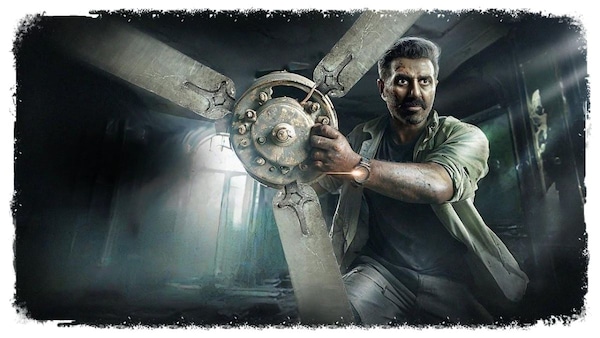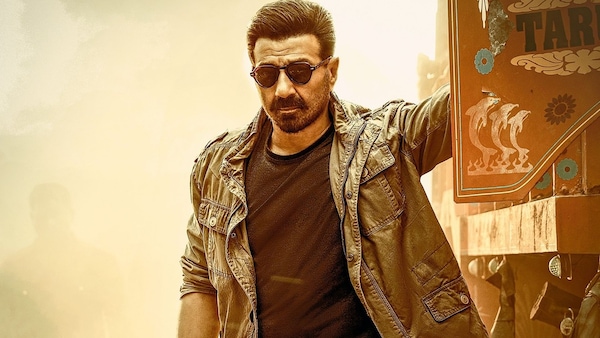In Jaat, Sunny Deol Mistakes Rage For A Character Arc
This is #CriticalMargin, where Ishita Sengupta gets contemplative over new Hindi films and shows. In this review, she declares Jaat is nothing more than 'Sunny Deol being Sunny Deol — again'.

Last Updated: 08.08 PM, Apr 10, 2025
WHEN YOU ARE A FILM CRITIC, the principal aspect of the job is to show up. It does not matter if one had a fight with their partner the previous night, or that maybe, there are ill parents in the scenario. If a film releases, one turns up. While this urgency is true for most jobs, the difference in this case is the surrender it demands. Unlike being at an office where plugging in headphones is an acceptable sulking option, theaters allow none of the indulgence. One is required to be objective and acknowledge fictional characters with severity as if they were real people.
This isn’t a complaint and, truth be told, there are upsides to it. For instance, my parents have been unwell for a while, and between calling them and meeting deadlines, my brow has been perpetually furrowed with concern. I have been thinking about the brutality of time and the many big and little ways in which it affects the people we love. Then I sat for Gopichand Malineni’s Jaat, and my worries were suspended for a while. Time, at least in some cases, appears to stand still.
Jaat features Sunny Deol doing the usual Sunny Deol things. He uproots things from the ground, refers to a woman probably younger than him as “Amma”, spells out the weight of his hand to random strangers, and actively looks out for opportunities to smash brawny men into paste. He protects women, sings the country's praises, and in the midst of all it, throws a punch or two.

In other words, at 67, Deol is doing everything he was doing at 47 (an arbitrary age milestone) and even before that. He displays no desire to reinvent, circumvent or even subvert familiarity. And neither does the film. Malineni’s Jaat plays out like every action film that exists in the universe featuring Deol. The actor continues to appear invincible, rendering anyone who attacks him a loser. You can throw a tree at him, but he will not flinch.
The only thing that has changed is the setting. After creating a ruckus in the north, Jaat marks Deol’s foray into the South. Shah Rukh Khan did it with Atlee in Jawan (2023), Salman Khan did it with AR Murugadoss in Sikandar (2025); it is now Deol’s turn. Jaat takes place in a rural region of Andhra Pradesh where people are being mercilessly killed. As the mystery deepens, an enigmatic tourist picks a fight in the same place. Man was eating hot idlis when a pack of rogues upturned his plate. Someone else would have bought another but because the person in question is essayed by Deol, this causes carnage. To quote Vineet Kumar Singh in the film, he is a “crack man”.
He demands an apology and keeps demanding it as he moves from one goon to another, raising the ante and treating the encounters as excuses to physically destroy more people. The rampage ends when he meets Ranatunga (Randeep Hooda), the dreaded illegal migrant from Sri Lanka who runs a syndicate of land dispossession. Of all the many meet-cutes between a hero and a villain, this might be the most bizarre.

But Malineni’s film, which has the imagination of an infant, is also fun till then. Deol wanting an apology (“sorry bol”) turns into a running gag, and the actor goes along, evidently amused. He sighs with exhaustion when he has to keep repeating the story and waits for the man on the other side to offer a patronising smile, only to start breaking things again. When there is more of this, there is less of Hooda, less of gratuitous violence, less of beheaded men.
All of this concentrates into the second half as Jaat, never a smart film and now disallowed to be fun, loses shape with the burden of messaging. A strange conspiracy theory is brought in, a subplot of Ranatunga snatching away land from villagers is introduced, and a group of female police officers are treated as the punchline for more violence. The film tries to be a bit of Jawan where an army of women rally around a male protagonist, but neither is Deol a selfless action star (he will not leave the hand pump for anyone else), nor does the film treat the women with the respect it demands for them.
Like other directors from Telugu cinema, Malineni has a distinct visual style that explodes in the multiple entry shot (for both Deol and Hooda). But, like many of his colleagues, he too leans on depicting violence with the excess of a fetish. Like, a child writing a letter to the President about the plight of her village and sending along severed fingers as a token of the subjugation, or the idea of female cops being disrespected, portrayed through harrowing moments of them getting disrobed. Or multiple scenes of Ranatunga and his men beheading their victims. The flair pushes for an imprint in less ornamental scenes like Ranatunga aping the posture of a crucified Jesus Christ at a church.
Hooda, always a physical actor, brings grave ruthlessness to his turn. His smouldering rage and volatile silences are built with scheming staging. But it says something about the intention of Jaat that everything deflates in minutes upon the entrance of Deol’s character, who, by the way, arrives in the most saffron train from Ayodhya. Beyond the layers of agenda and posturing, this is a film that also refuses to respect the intellect of its audience.
Disclaimer: The views expressed in this column are those of the author and do not necessarily reflect the official policy or position of OTTplay. The author is solely responsible for any claims arising out of the content of this column.

 Premium
Premium